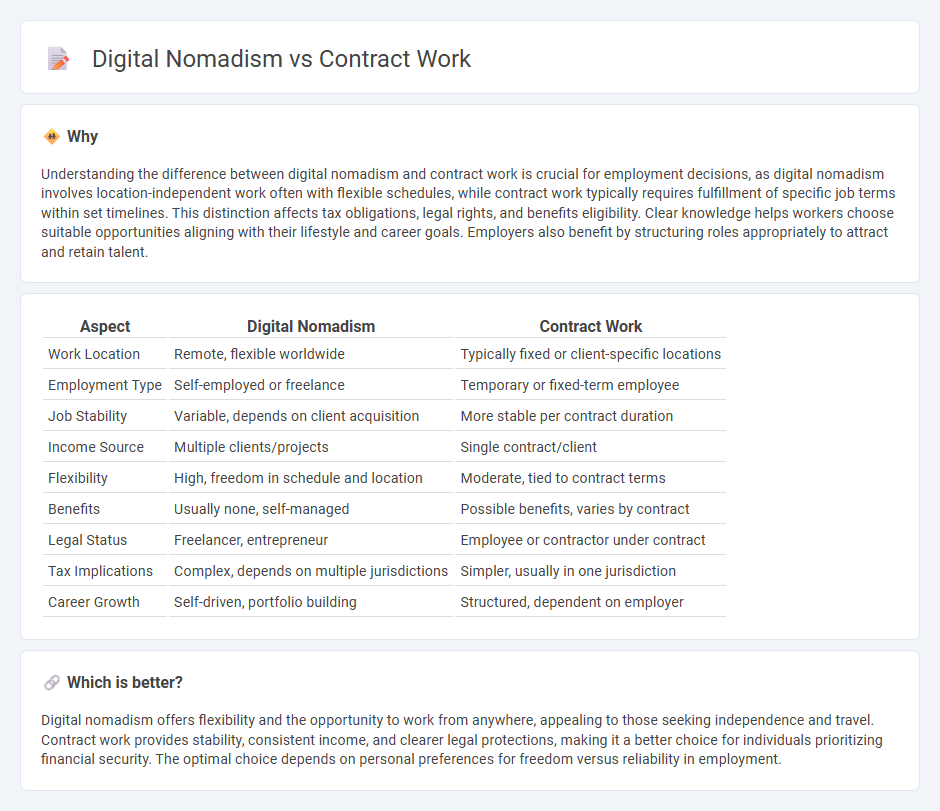
Digital nomadism offers unparalleled geographic freedom, allowing professionals to work remotely from anywhere in the world while maintaining a flexible lifestyle. Contract work, on the other hand, emphasizes fixed-term employment with specific deliverables, often providing more financial stability and clearer job expectations. Explore the advantages and challenges of both employment models to determine which suits your career goals best.
Why it is important
Understanding the difference between digital nomadism and contract work is crucial for employment decisions, as digital nomadism involves location-independent work often with flexible schedules, while contract work typically requires fulfillment of specific job terms within set timelines. This distinction affects tax obligations, legal rights, and benefits eligibility. Clear knowledge helps workers choose suitable opportunities aligning with their lifestyle and career goals. Employers also benefit by structuring roles appropriately to attract and retain talent.
Comparison Table
| Aspect | Digital Nomadism | Contract Work |
|---|---|---|
| Work Location | Remote, flexible worldwide | Typically fixed or client-specific locations |
| Employment Type | Self-employed or freelance | Temporary or fixed-term employee |
| Job Stability | Variable, depends on client acquisition | More stable per contract duration |
| Income Source | Multiple clients/projects | Single contract/client |
| Flexibility | High, freedom in schedule and location | Moderate, tied to contract terms |
| Benefits | Usually none, self-managed | Possible benefits, varies by contract |
| Legal Status | Freelancer, entrepreneur | Employee or contractor under contract |
| Tax Implications | Complex, depends on multiple jurisdictions | Simpler, usually in one jurisdiction |
| Career Growth | Self-driven, portfolio building | Structured, dependent on employer |
Which is better?
Digital nomadism offers flexibility and the opportunity to work from anywhere, appealing to those seeking independence and travel. Contract work provides stability, consistent income, and clearer legal protections, making it a better choice for individuals prioritizing financial security. The optimal choice depends on personal preferences for freedom versus reliability in employment.
Connection
Digital nomadism and contract work are interconnected through the flexibility and autonomy they provide professionals to work remotely from any location while engaging in project-based or short-term contracts. Contract work enables digital nomads to diversify their income streams by taking on multiple assignments with different clients, leveraging global connectivity and freelance platforms. This synergy supports a dynamic employment model where individuals prioritize experience and location independence over traditional, long-term employment arrangements.
Key Terms
Flexibility
Contract work offers flexibility through defined project timelines and remote work possibilities, allowing professionals to choose when and where to complete tasks. Digital nomadism provides unparalleled location independence, enabling individuals to work from various global destinations without fixed schedules. Explore more about how these lifestyles can maximize your personal and professional freedom.
Remote Work
Contract work in remote settings offers flexibility with defined project scopes, enabling professionals to leverage skills on a per-assignment basis while maintaining autonomy over location. Digital nomadism emphasizes lifestyle mobility, blending continuous remote employment or freelance work with constant travel, often relying on co-working spaces and reliable internet access worldwide. Explore the evolving landscape of remote work to understand how contract roles and digital nomadism shape the future of global employment.
Autonomy
Contract work typically offers professionals defined project scopes and timelines, providing moderate autonomy within set boundaries. Digital nomadism amplifies autonomy by enabling individuals to choose their work environments and schedules, fostering greater control over lifestyle and productivity. Explore how balancing contract work and digital nomadism can optimize your autonomy in the modern workforce.
Source and External Links
What Is a Contract Job, and How Does It Work in 2025? - Upwork - A contract job involves hiring a worker for a specific task during a set period for a fixed amount, offering businesses flexibility and professionals opportunities to expand skills and maintain control over their work.
Contractor Opportunities | The Cigna Group Careers - Contract roles provide temporary assignments with options for flexible work arrangements and potential transition to full-time positions, often facilitated through a third-party employer.
Independent contractor (self-employed) or employee? - IRS - It's important to correctly classify workers as independent contractors or employees due to tax withholding and legal implications, with contractors responsible for their own taxes.
 dowidth.com
dowidth.com